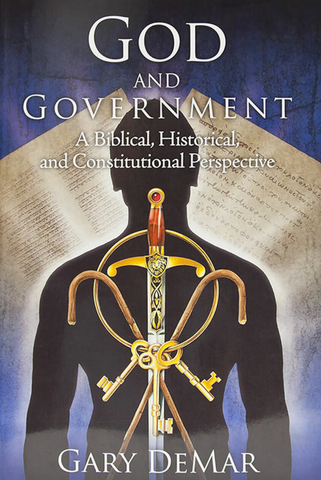Gary discusses the concept of dominion and what it means
For centuries Christians were seen as a threat by those who claim the state as the only true sovereign: “These men who have upset the world have come here also; and Jason has welcomed them, and they all act contrary to the decrees of Caesar, saying that there is another king, Jesus” (Acts 17:6-7).
Whoever claims sovereignty expects his subjects to govern his realm in terms of his law and name. Sovereignty, therefore, brings with it the inevitability of dominion, the power of governing and controlling all things. Noah Webster, in his American Dictionary of the English Language (1828), defines sovereignty this way: “Supreme power; supremacy; the possession of the highest power, or of uncontrollable power. Absolute sovereignty belongs to God alone.” The beast of Revelation 13 claims absolute sovereignty by requiring his subjects to operate in terms of his law and name. Those who do not conform eventually will be destroyed: ‘‘And he causes all, the small and the great, and the rich and the poor, and the free men and the slaves, to be given a mark on their right hand, or on their forehead, and he provides that no one should be able to buy or sell, except the one who has the mark, either the name of the beast or the number of his name” (vv. 16, 17). The Lamb, the only true Sovereign, expects dominion to be exercised in His name (14:1, 5).
The denial of one sovereign assumes the sovereignty of another. If God is denied as the only truly independent sovereign, man will claim this attribute for himself. To deny God as sovereign does not destroy the reality of sovereignty. Sovereignty is only transferred. For example, when Jerusalem was plundered by Nebuchadnezzar and his army, certain young men were brought to Babylon “to enter the king’s personal service” (Daniel 1:5). Nebuchadnezzar showed his denial of the absolute and independent sovereign rule of God by besieging Jerusalem and taking some of the holy vessels of the house of God and bringing them to the house of his god (vv. 1-2). This action by Nebuchadnezzar was symbolic. It was to show the sons of Judah that there is now a new sovereign who claims absolute control and expects them “to enter the king’s personal service” (v. 5). Dominion would continue, but it would be on Babylonian terms.
Only when men recognize the sovereign rule of God can true liberty be secured. Biblical Christianity, because it alone acknowledges the one and only Sovereign, has brought liberty in abundance. “That whatever the world now enjoys of civil and religious liberty, it owes to the Bible and Christianity; and that the progress of the principles of true liberty depends upon the progress of Christianity. Both the past history and the present state of the world justify this conclusion.”[1] Those who wish to rule must do so in terms of the Absolute Sovereign, God. Nebuchadnezzar saw himself as an independent sovereign who was responsible to no one. He thought of himself as a divine king in a divine State (Daniel 3). His claim to sovereignty destroyed the liberties of the people and similar actions by his posterity brought judgment upon the nation (Daniel 5).

God and Government
American Vision has thoroughly renovated, revised, and updated Gary DeMar’s monumental work into this beautiful one-volume hardback. With a fresh new look, more images, an extensive subject and scripture index, and an updated bibliography, God and Government is ready to prepare a whole new generation to take on the political and religious battles confronting Christians today. May it be used in a new awakening of Christians in America—not just to inform minds, but to stimulate action and secure a better tomorrow for our posterity.
Buy NowGary discusses the concept of dominion and what it means. Many get upset by the word and the implications of man “dominating” the earth and other people, but what Gary points out is that dominion is an inescapable concept; there’s always someone seeking to impose their idea of dominion on your and your family.
Click here for today’s episode
Click here to browse all episodes of The Gary DeMar Podcast
[1] N. L. Rice, “The Moral Effects of Christianity,” Lectures on the Evidences of Christianity, ed. William S. Plumer (New York, NY: Robert Carter Brothers, 1852), 601.

